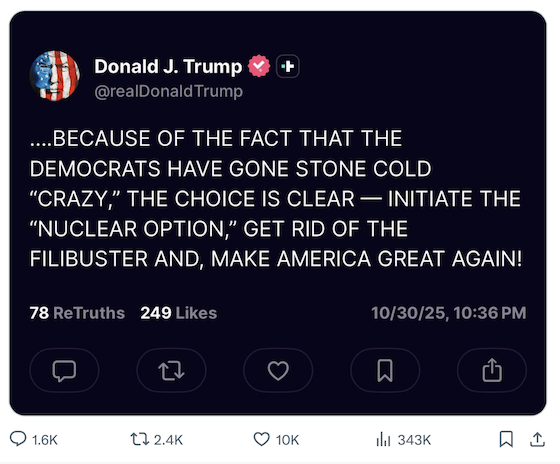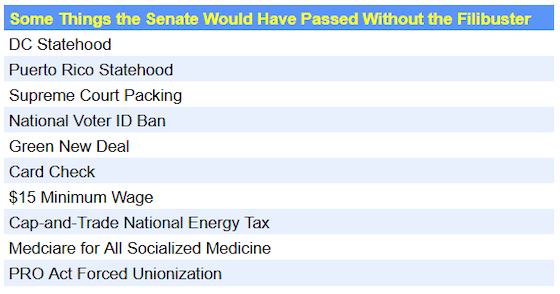President Trump has called on Senate Republicans to end the Schumer Shutdown by doing away with the filibuster:
And again:
Trump is probably right that the Democrats will abolish the filibuster the next opportunity they get. But is it a good idea for Republicans to do away with it now? Last week, before Trump weighed in, I talked to a Washington insider about this means of ending the shutdown. He strongly opposed it, on the ground that the filibuster tends to help Republicans more than Democrats. This is because Democrats have a lot of sweeping legislation that they would like to pass, while Republicans really don’t. Controlling spending and cutting taxes can be done through reconciliation, which is already immune from the filibuster.
Stephen Moore and his Committee to Unleash Prosperity have the same idea:
Some of the worst legislation in history – like the cap-and-trade carbon tax, union card check, and ending right to work – was prevented thanks to the filibuster.
Over the years, the filibuster has been a protective shield for liberty against passing bad laws. Our entire Constitution is about protecting the rights of the minority. Majority rule is a dangerous thing. As the old saying goes: majority rule is two wolves and a sheep voting on what to have for dinner.
We want to make it HARDER, not easier, to pass laws through Congress – especially spending bills. We should never forget that our freedoms are most protected when Congress is NOT in session.
Makes sense, but there is one thing I don’t understand: in the past there have been filibuster carve-outs. Reconciliation bills can’t be filibustered, nor can federal judge nominations. Why couldn’t Republicans abolish the filibuster, only for continuing spending resolutions? Aren’t they analogous to reconciliation bills? In the present instance, the Schumer Shutdown is intended to force Republicans to repeal portions of the Big Beautiful Bill–which, as a reconciliation package, couldn’t be filibustered.
So, wouldn’t it be possible to stop the Schumer Shutdown and prevent similar antics in the future, by amending the Senate rules, but only as to continuing resolutions? Maybe someone who is more knowledgeable about Senate procedures than I am can answer that question.
















